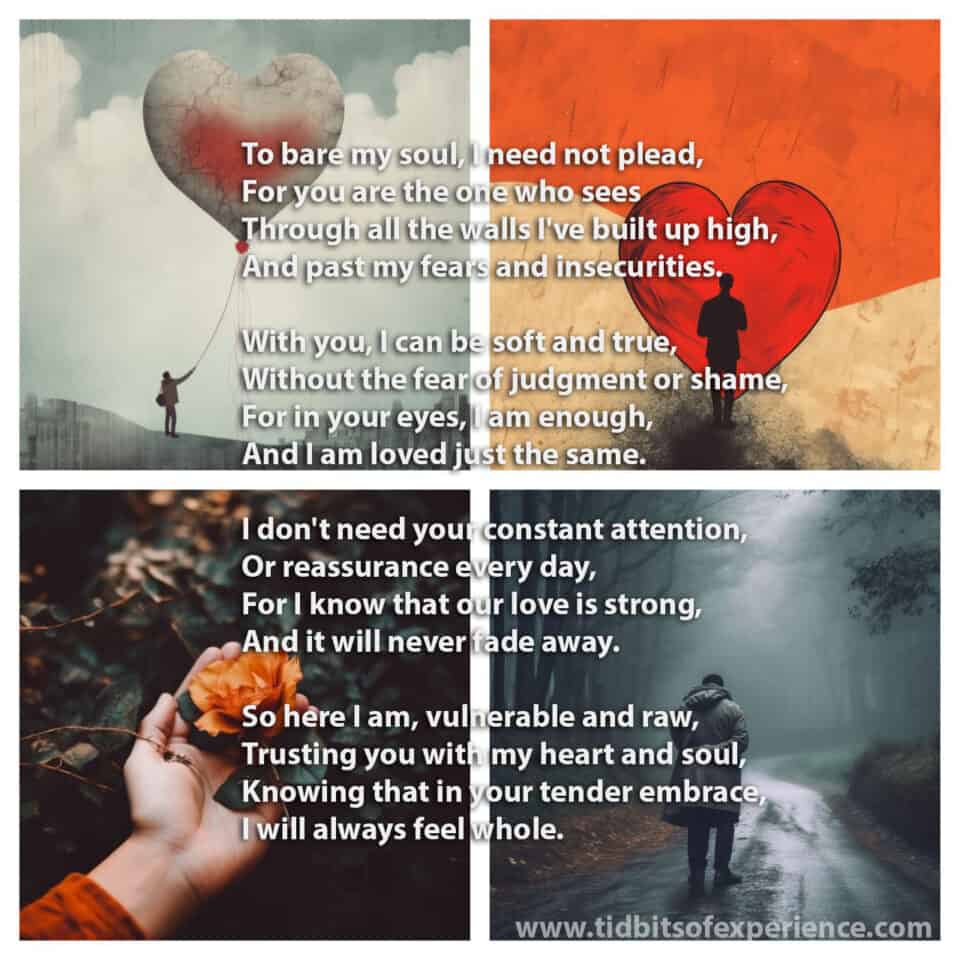Being vulnerable is often considered the key to building strong and authentic relationships. However, striking a balance between expressing genuine vulnerability and coming across as needy can be challenging.
In this blog post, we’ll explore how to be vulnerable without being needy, embracing vulnerability without falling into the trap of neediness, and ultimately empowering you to unlock inner strength and success in your personal and professional relationships.
Get ready to transform your life by fostering deeper connections while maintaining an attractive sense of self-assurance.
Key Takeaways
- Vulnerability is important in building strong and authentic relationships, but it’s essential to strike a balance between expressing genuine vulnerability and coming across as needy.
- Healthy vulnerability involves openly expressing your feelings, thoughts, and desires without expecting any specific response. Needy behavior often stems from a lack of self-esteem or validation-seeking tendencies.
- Tips for being vulnerable without being needy include learning to trust yourself and others, setting boundaries and recognizing your limits, practicing self-care and self-compassion, communicating effectively and honestly, and building a support system.
- Overcoming fear and shame requires identifying limiting beliefs that may be holding you back from being vulnerable, practicing self-acceptance and self-love, and acknowledging imperfections without judgment or criticism.
Table of Contents
Understanding Vulnerability And Needy Behavior

In this section, I will define vulnerability and neediness while highlighting the differences between showing healthy vulnerability versus displaying clingy or needy behavior.
Defining Vulnerability And Neediness
Vulnerability is often misunderstood as a sign of weakness, but in reality, it’s an emotionally mature trait that involves being open and honest with others about your feelings, thoughts, and experiences.
It means allowing yourself to be seen for who you are—warts and all—and trusting that those around you will respect and honor your openness.
On the other hand, neediness refers to behaviors driven by insecurity and emotional dependence on others for validation and self-worth. Neediness can manifest as excessive demands for reassurance or attention from partners, friends, or family members.
A needy person might constantly seek compliments or approval from others due to their own insecurities—an unattractive trait that can strain relationships over time.
Recognizing The Difference Between Healthy Vulnerability And Needy Behavior
Understanding the distinction between healthy vulnerability and needy behavior is essential for cultivating successful relationships. Healthy vulnerability involves openly expressing your feelings, thoughts, and desires to your partner, which fosters trust and deepens emotional connections.
For example, you might share a past experience that has shaped your outlook on life or reveal fears about the future without expecting any specific response.
On the other hand, needy behavior often stems from a lack of self-esteem or validation-seeking tendencies. Needy individuals may continuously seek reassurance from their partners, become excessively clingy, or make unrealistic demands on their partner’s time and attention.
This type of behavior can be draining and even manipulative in some cases.
By recognizing these differences and practicing healthy vulnerability, women can build stronger relationships rooted in trust while avoiding unattractive neediness that undermines connection and growth.
The Importance Of Vulnerability

Being vulnerable is crucial to building stronger and more authentic relationships, promoting personal growth and self-awareness, and fostering honesty and authenticity. Learn how to embrace vulnerability without coming across as needy to cultivate deeper connections.
Building Stronger, More Authentic Relationships
Embracing vulnerability is essential for establishing stronger, more authentic relationships with those around you, particularly when it comes to romantic partnerships.
For example, openly discussing your fears or insecurities can foster a sense of understanding and empathy within the relationship, allowing both parties to support each other in tangible ways.
By expressing your emotions honestly rather than hiding them away or sugarcoating them, you create an environment where deep connections can flourish. This level of openness and authenticity strengthens the bond between partners and their individual self-awareness and personal growth.
Encouraging Personal Growth And Self-awareness
Encouraging personal growth and self-awareness is an essential aspect of practicing vulnerability. By embracing our vulnerabilities and learning to express ourselves honestly, we can become more self-aware of our emotional needs, triggers, and thought patterns.
Personal growth requires stepping out of your comfort zone and being open to change. As you take steps towards being vulnerable without coming across as needy, you’ll start seeing the positive impacts on your life.
Self-compassion also plays a critical role in personal growth through vulnerability since it helps cultivate resilience.
Promoting Honesty And Authenticity
Being honest and authentic with ourselves and others can be daunting, especially if we have spent years hiding our true selves. However, promoting honesty and authenticity in our relationships is crucial to building strong connections with those around us.
When we are honest and authentic in our relationships, it encourages others to reciprocate the same level of trust. This leads to more meaningful conversations and a deeper emotional connection between individuals.
For instance, if you’re struggling with something at work or within your personal life – communicate that vulnerability with your partner or close friend.
Authenticity also means embracing who we truly are without trying to change who we are just because someone else expects something different from us. When we show up as ourselves- flaws included- it sets a foundation for more genuine interactions where people can know us deeper beyond surface-level small talk.
Ultimately this approach helps build lasting relationships based on trust since there is no pretense involved when both parties embrace themselves authentically before each other, meaning growth could emerge from these interactions rather than stagnation arising from hiding behind walls of untruths creating unrealistic expectations which can cripple future prospects either personally or professionally become non-existent due distrust across all lines.
Tips On How To Be Vulnerable Without Being Needy

To be genuinely vulnerable without coming across as needy, learn to trust yourself and others, set boundaries and recognize your limits, practice self-care, and self-compassion, communicate effectively and honestly, and build a support system.
Learning To Trust Yourself And Others
Trusting yourself and others is vital when it comes to being vulnerable in relationships. Without trust, we won’t be able to open up fully and share our true selves. Learning to trust can be difficult, especially if you’ve been hurt before.
But there are strategies that can help you build trust over time, such as setting expectations upfront, communicating honestly and openly about your feelings and needs, respecting boundaries, and giving yourself permission to make mistakes.
Trusting yourself also means listening to your intuition and gut instincts – learning to tune into those internal signals that tell us what feels right or wrong for us can help us navigate relationships more confidently.
For example, imagine feeling like your partner isn’t really listening or paying attention when you speak up about a concern or need. Trusting yourself allows you the confidence of knowing what non-negotiables are important for your happiness in a healthy relationship dynamic, while trusting another person gives them the space within which they may express themselves without fear of rejection or shame.
Setting Boundaries And Recognizing Your Limits
Establishing healthy boundaries is essential for empowering yourself and having fulfilling relationships. It means being aware of your emotional needs, communicating them clearly, and respectfully enforcing them.
When you set boundaries, you have more control over how others treat you and the level of respect they give you. For example, if someone constantly crosses your boundaries by demanding too much of your time or energy, it’s crucial to let them know that their behavior is unacceptable.
Recognizing your limits is also important in setting healthy boundaries. This means understanding what you can and cannot handle emotionally or physically without feeling drained or overwhelmed; it’s not selfish to prioritize taking care of yourself first.
Knowing when to say “no” and setting realistic expectations for yourself can help reduce stress levels significantly while avoiding burnout down the line.
Practicing Self-care And Self-compassion
Taking care of ourselves is crucial in building resilience and inner strength to face life’s challenges. Practicing self-care involves making time for activities that promote our physical, emotional, and mental well-being.
Additionally, cultivating self-compassion involves treating ourselves with kindness and understanding when we make mistakes or experience difficult emotions. Rather than criticizing or judging ourselves harshly, we can approach our experiences with curiosity and empathy.
By acknowledging our vulnerabilities without self-judgment or criticism, we create space for growth and healing.
Communicating Effectively And Honestly
Communicating your thoughts and feelings effectively and honestly is crucial when it comes to vulnerability in relationships. It helps build trust, deepens emotional connection, and promotes authenticity.
For instance, if you’re feeling upset about something your partner did or said, instead of bottling up those emotions or resorting to passive-aggressive behavior, take the time to calmly express how you feel using “I” statements.
For example: “I felt hurt when you canceled plans last minute.” This allows for a constructive conversation where both parties can understand each other’s perspective without placing blame or defensiveness.
Building A Support System
Creating a supportive network of friends, family, and mentors can be crucial in developing the skills necessary to be vulnerable without being needy. It’s important to seek out people who you trust and feel comfortable opening up to.
Sharing your thoughts and feelings with someone who listens attentively can provide an enormous sense of relief and validation. In addition, having positive role models or a mentor who has gone through similar struggles may give you the motivation and guidance needed to navigate difficult situations.
By cultivating these relationships, you’ll gain confidence in expressing yourself honestly without feeling clingy or overbearing.
Overcoming Fear And Shame

To overcome fear and shame, it’s important to identify and address limiting beliefs that may be holding you back from being vulnerable.
Identifying And Addressing Limiting Beliefs
Limiting beliefs can hold us back from embracing vulnerability and expressing ourselves honestly.
To overcome these limiting beliefs, it’s important to first identify them and understand how they impact our thoughts and behaviors. This may involve reflecting on past experiences where these beliefs were triggered.
Once identified, we can challenge these limiting beliefs by gathering evidence that contradicts them or reframing them more positively.
Practicing Self-acceptance And Self-love
One of the most important aspects of being vulnerable without being needy is practicing self-acceptance and self-love. This means acknowledging your flaws, accepting yourself as you are, and loving yourself unconditionally.
To practice self-acceptance and self-love, start by examining your beliefs about yourself. Identify any negative thoughts or patterns holding you back from fully loving and accepting yourself.
Remember that practicing self-love isn’t about being perfect; it’s about embracing and recognizing your imperfections as strengths. As Brené Brown says: “Vulnerability sounds like truth and feels like courage.
Learning From Past Experiences And Mistakes
Learning from past experiences and mistakes is essential to finding the inner strength to be vulnerable without being needy. It’s important to recognize that everyone makes mistakes and has moments of vulnerability.
For example, maybe you opened up to a partner about a difficult situation, but they didn’t respond well. Rather than feeling discouraged or ashamed, reflect on what could have been done differently and how you can communicate your needs more effectively in the future.
Finding Inner Strength And Resilience
Developing emotional intelligence and self-regulation are key components of finding inner strength and resilience. Discover practical strategies to build emotional stability to embrace vulnerability as a strength.
Developing Emotional Intelligence And Self-regulation
Developing emotional intelligence and self-regulation is crucial when it comes to practicing vulnerability without being needy. Emotional intelligence allows you to manage your own emotions and understand the emotions of those around you.
One way to develop emotional intelligence is by taking time for self-reflection. Take a moment to reflect on how you feel, what triggers your emotions, and how they impact your behavior in different situations.
This will enable you to identify patterns of behavior that are not serving you well so that you can work on changing them. Developing healthy coping mechanisms such as exercise or mindfulness meditation can also help regulate strong emotions during difficult moments.
Building Positive Coping Mechanisms And Resilience Strategies
One way to be vulnerable without being needy is by developing positive coping mechanisms and resilience strategies. These skills can help individuals manage stress and life’s challenges while maintaining emotional balance.
Examples of positive coping mechanisms include meditation, exercise, spending time in nature, or engaging in hobbies that provide a sense of joy and fulfillment.
Studies show that these types of coping skills are essential for building resilience and emotional well-being over time. In fact, research has found that supportive relationships combined with active skill-building are key factors in making an individual more resilient.
Embracing Vulnerability And Imperfection As Strengths
Many of us have been conditioned to believe that vulnerability is a weakness and imperfection is something to be ashamed of. However, embracing vulnerability and imperfection can actually be a strength.
It takes courage to show vulnerability, but research professor Brené Brown believes that it’s the measure of true courage. We can learn from our mistakes and become more self-aware by embracing our imperfections.
This allows us to develop emotional intelligence and regulation skills, which help build resilience when facing challenges in life.
Building Healthy Relationships
Practice openness and honesty to deepen your emotional connection with others while recognizing the difference between vulnerability and codependency.
Practicing Openness And Honesty
Being open and honest in your relationships can create a deeper sense of intimacy and trust. Sharing your thoughts, feelings, and experiences with others can be scary, but practicing vulnerability is essential for building healthy connections.
This means being truthful about your emotions, even when it’s uncomfortable or difficult. For instance, tell your partner how you feel when they cancel plans on short notice or express what you need without feeling guilty or ashamed.
By opening up and being honest with those around us, we create an environment where people feel comfortable doing the same with us. Being vulnerable helps strengthen relationships by promoting authenticity and transparency while reducing misunderstandings arising from a lack of honesty.
Recognizing The Difference Between Vulnerability And Codependency
It’s essential to understand that vulnerability is not the same as codependency. Vulnerability is about being open and honest with yourself and your partner, which can lead to a deeper connection and a more fulfilling relationship.
For example, if you feel you can’t be happy without your partner or constantly seek validation from them, it may be a sign of codependency rather than a healthy vulnerability.
Recognizing the difference between these two behaviors can help you build stronger relationships based on mutual trust and respect rather than dependency.
Building Trust And Connection
Building trust and connection is a crucial part of any healthy relationship, romantic or otherwise. Trust takes time to develop, but there are steps you can take to foster it.
One important strategy is honesty – being open about your thoughts and feelings can help build a foundation of trust between you and your partner.
Connection also plays an essential role in building strong relationships. Connecting with someone on an emotional level requires vulnerability – allowing yourself to be seen authentically.
Sharing your fears, hopes, and dreams can help deepen your relationship with your partner.
Deepening Your Emotional Connection
To deepen your emotional connection with someone, it’s important, to be honest and open about how you feel. It can be scary to reveal your innermost thoughts and feelings, but it’s essential to building trust and intimacy.
Start by taking small steps towards vulnerability, such as sharing a personal story or expressing gratitude for something they’ve done.
It’s also important to actively listen when the other person is speaking. This means giving them your full attention without interrupting or judging them. You create space for deeper emotional connection in the relationship by showing empathy and compassion.
Remember that vulnerability can be reciprocal – you encourage others to do the same by opening up yourself.
Maintaining Balance In Your Relationships
Maintaining balance in your relationships is crucial for building a happy and healthy partnership with your significant other. It involves establishing mutual trust, honesty, respect, and loyalty.
Achieving balance also means recognizing that each person has their limit and respecting these limits while understanding when it’s okay to compromise. A balanced relationship allows room for independence outside the relationship without sacrificing time spent together.
Awareness of these boundaries fosters empathy and builds stronger bonds between partners while helping individuals maintain their sense of self in the partnership.
Frequently Asked Questions (About How To Be Vulnerable Without Being Needy)
What does it mean to be vulnerable without being needy?
Being vulnerable means opening up and sharing your thoughts, feelings, and experiences with others. However, being needy involves seeking constant validation and attention from others, which can be draining for both you and the people around you. Being vulnerable without being needy requires finding a balance between sharing openly, respecting boundaries, and recognizing that other people’s opinions do not determine your self-worth.
How can vulnerability help me succeed in life?
Vulnerability can lead to deeper connections with others and increased self-awareness and personal growth. It allows us to build trust and empathy with those around us, ultimately leading to more opportunities for success in our relationships, careers, and personal lives.
What are some tips for practicing vulnerability?
Some tips for practicing vulnerability include starting small by sharing something personal with a trusted friend or therapist, learning how to communicate effectively by using “I” statements instead of blaming or accusing language, setting healthy boundaries for yourself in relationships, and continuing to work on building your own self-esteem so that you don’t rely solely on external validation.
How do I know if I am crossing the line into neediness?
If you find yourself constantly seeking reassurance or attention from others, regularly changing your behavior or beliefs based on what other people think of you, feeling devastated when someone doesn’t respond positively to something you have shared with them personally- then these are signs that indicate that one might be dealing with emotional neediness rather than just simple openness about one’s emotions. It is important to recognize these patterns early before they become damaging habits that negatively impact our well-being over time.
Conclusion
In conclusion, being vulnerable without being needy is essential for finding inner strength and success. Vulnerability allows us to build genuine connections with others, promoting personal growth and self-awareness.
Tips such as learning to trust ourselves and setting boundaries can help us express ourselves honestly while maintaining balance in our relationships. Overcoming fear and shame through accepting our imperfections and building resilience leads to emotional intelligence, self-regulation, and positive coping mechanisms.
Being vulnerable takes courage but is a strength that ultimately leads to deeper connections with those around us.
